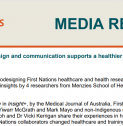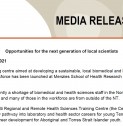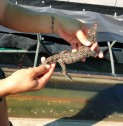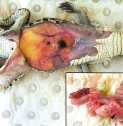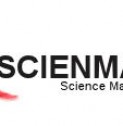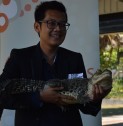Mark Mayo
Deputy Director First Nations Leadership, Senior researcher, and Co-lead for The Ramaciotti Regional and Remote Health Sciences Training Centre
Qualifications:
Bachelor of Science, Charles Darwin University, 2002; Associate Diploma of Science, Charles Darwin University, 1996; Diploma of Project Management, BizNorth, 2011.
Location:
Darwin - Royal Darwin Hospital campus
Biography:
Mark Mayo is of Aboriginal and Torres Strait Islander heritage, he is a descendant of the Mudburra people in the N.T. and the Torres Strait Islander people of the islands Mabuiag and Badu in the Torres Straits, QLD. Mark is a graduate of Charles Darwin University and is a leading Australian First Nations researcher with 32 years of experience in biomedical research. Mark is has worked on both laboratory and non-laboratory-based projects during his research career at the Menzies School of Health Research, Darwin, Australia. He is pivotal to the Menzies Aboriginal and Torres Strait Islander leadership, engagement, training, and mentoring programs. Mark’s interests in Australian First Nations people’s health have led him to work on many research projects during his time at the Menzies School of Health Research from COVID, Group A strep, malaria, melioidosis, petrol sniffing and childhood ear diseases. Mark’s primary research area has been melioidosis, a potentially fatal tropical disease found in Northern Australia. Mark’s research into this disease covers many different aspects, from early detection of the disease in hospital and clinical settings, to understanding the environmental niche of the bacteria and the potential exposure risks to people and animals in an endemic region.
- Darwin Prospective Melioidosis Study (D.P.M.S)
- Linking genomics of Burkholderia pseudomallei to melioidosis: diversity of clinical manifestations, changing epidemiology and microevolution in chronic carriage
- Characterisation of Burkholderia pseudomallei using unique genomic components
- Melioidosis in Malaysian Borneo
- The melioidosis agent, Burkholderia pseudomallei, in the anthropogenic environment of Northern Australia.
- Burkholderia pseudomallei in Australia: A perspective of distribution and source attribution
- The occurrence of the melioidosis agent Burkholderia pseudomallei in scats from captive and wild animals in the Darwin region.
- Price, E. P., Sarovich, D. S., Mayo, M., Tuanyok, A., Drees, K. P., Kaestli, M. et al. (2013). Within-host evolution of Burkholderia pseudomallei over a twelve-year chronic-carriage infection. mBio: In Press.
- McRobb E., Kaestli M., Mayo M., Price E.P., Sarovich D.S., Godoy D., et al. (2013). Melioidosis from contaminated bore water and successful UV sterilization. American Journal of Tropical Medicine Hygiene: in press.
- Hill A., Mayo M., Kaestli M., Price E., Richardson L., Godoy D., et al. (2013) Melioidosis as a consequence of sporting activity. American Journal of Tropical Medicine Hygiene: in press.
- Limmathurotsakul, D., Dance, D. A. B., Wuthiekanun, V., Kaestli, M., Mayo, M., Warner, J. et al. (2013). Systematic review and consensus guidelines for environmental sampling of Burkholderia pseudomallei. PLoS Neglected Tropical Diseases, 7(3).
- Kaestli, M., Schmid, M., Mayo, M., Rothballer, M., Harrington, G., Richardson, L., et al (2012). Out of the ground: Aerial and exotic habitats of the melioidosis bacterium Burkholderia pseudomallei in grasses in Australia. Environmental Microbiology, 14(8), 2058-2070.
- Richardson, L. J., Kaestli, M., Mayo, M., Bowers, J. R., Tuanyok, A., Schupp, J., et al. (2012). Towards a rapid molecular diagnostic for melioidosis: Comparison of DNA extraction methods from clinical specimens. Journal of Microbiological Methods, 88(1), 179-181.
- Hampton V., Kaestli M, Mayo M., Low Choy J., Harrington G., Richardson L., et al. (2011). Melioidosis in birds in Australia and the potential for dispersal of Burkholderia pseudomallei. Emerging Infectious Disease, 17, 1310-1312.
- Mayo M., Kaestli M., Harrington G., Cheng A.C., Ward L., Karp D., et al. (2011) Burkholderia pseudomallei in un-chlorinated domestic bore water in tropical northern Australia. Emerging Infectious Disease, 17, 1283-1285.
- Draper, A. D. K., Mayo, M., Harrington, G., Karp, D., Yinfoo, D., Ward, L., et al. (2010). Association of the melioidosis agent Burkholderia pseudomallei with water parameters in rural water supplies in northern Australia. Applied and Environmental Microbiology, 76(15), 5305-5307.
- Kaestli, M., Mayo, M., Harrington, G., Ward, L., Watt, F., Hill, J. V., et al. (2009). Landscape changes influence the occurrence of the melioidosis bacterium Burkholderia pseudomallei in soil in northern Australia. PLoS Neglected Tropical Diseases, 3(1).








